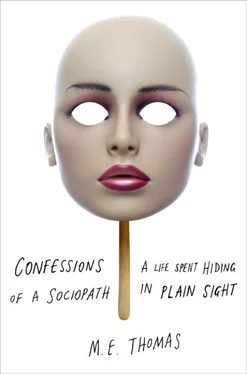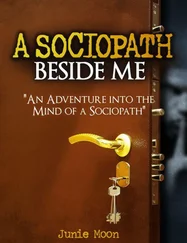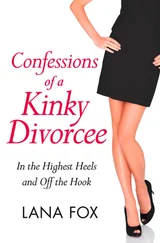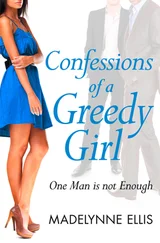One summer I lost all of my savings trading high-risk options. Not only were the options risky, I took an incredibly risky approach to them—holding when I should have sold and putting all of my eggs in one basket. Even after many failed trades, I still took unnecessary gambles. I knew objectively that I was losing a lot of money, but I couldn’t make myself feel the pain of it in a way that seemed to matter. Though it doesn’t seem related, I don’t use knives. The risk of injury never sinks in, even with such a mundane tool. I’ve cut myself many times, lopping off chunks of skin or cutting down to the bone and requiring stitches, but I can never force myself to be more careful, so now I just don’t use them.
I’ve always loved to bike in cities, partly because it’s so dangerous. If a car starts creeping into my lane, I will punch at it or use my portable tire pump to swing at it. If a car cuts me off, I will follow it until I catch up, then dart in front and come to a skidding halt, forcing them to slam on their brakes. I’m sure it’s incredibly dangerous for me to do this, and really only for me, but it also freaks the hell out of them. And I don’t really care for my safety enough to change my behavior. It’s not that I’m being irrational. It’s that suffering the consequences of something rarely involves actual “suffering.” Maybe there is a small thrill in taunting drivers or risking my life savings, but mainly it’s that I just don’t feel sufficient anxiety in these situations warning me to be more careful.
I can’t tell you how many times I have gotten food poisoning from eating rotten and questionable food, but I never seem to learn my lesson. A few years ago I woke up naked on the floor of a YMCA shower. I couldn’t remember how I had gotten there, but I am sure it was something stupid. People who know their limits don’t end up passed out naked in a YMCA. I don’t have the off switch in my brain telling me when to stop—no natural sense of boundaries alerting me to when I am on the verge of taking something too far. When I do these things, it doesn’t feel as if I’m so overwhelmed by the carrot; it’s more like I am so unimpressed by the stick.
I have always lived in the worst neighborhoods. Rent is cheap and I figure there’s no need for me to pay a safety premium if I have health insurance. It drives my friends and family crazy, but it makes me easy to shop for when it comes to birthdays and Christmas: pepper spray, dead bolts, automobile theft deterrents, etc. Just after college I lived next door to a drug-infested Chicago housing project, taking night jogs through the neighborhood with headphones blaring loud enough to cover the sounds of gunshots, which were pretty loud. Recently I walked in on my apartment getting burglarized for the second time—the first time was just a few days after I had moved in. When it’s not getting burglarized, I get visitors banging on my door at all hours of the night. (I think one of my neighbors might be a drug dealer and these people are mistaking my apartment for his. Just idle conjecture.)
Perhaps my risk taking can be best seen in terms of my affection for and mishaps with motor vehicles. I love cars. I feel invincible behind the wheel, and I often put myself and others at risk because I didn’t think through the consequences of my decisions. Once when my brakes started going out, I opted to drive the car into the mechanic’s rather than pay for a tow, even though I had driven much too long on the brakes, until they were all but useless. It was rainy that day and I had to drive several miles on a steady decline. Making matters worse, when I got close to the shop, I saw that I would have to cross a bridge over train tracks, which rose and fell dramatically over the distance of about a block on a busy four-lane main thoroughfare. By the time I was at the bottom of the bridge without brakes, I was going at least forty-five miles an hour, much too fast for traffic that was slowing at a red stoplight up ahead. Making a split-section decision, I jerked the wheel to the left and power-slid across two lanes of opposing traffic, across both lanes of a parallel frontage road, and finally jolted to a stop when the right rear and then front wheel made contact with the curb on the far side of the street. I looked up at the addresses on the buildings and noticed that I was just south of the driveway to the mechanic’s, so I crawled into the parking lot and used the parking brake to come to a full stop, all to the gaping stares of onlookers.
Of course I was pretty pleased with myself at the time. It’s nice to have proof of your seeming invincibility. But if it had gone horribly wrong—had my car slid off the bridge and exploded on impact—I would have felt much the same about it. As long as I keep surviving, I seem okay. It’s not that bad things don’t happen to me; they do. But I just don’t feel that bad about them. Maybe in the moment I feel some regret or anxiety, but it’s quickly forgotten and the world seems ripe with promise again. I’m not superhuman, not entirely immune to sorrow or pain. I just have an extremely robust sense of optimism and self-worth that keeps me looking at the world through rose-colored glasses.
Although I am largely immune to misery, my siblings and friends aren’t. They sometimes hate me for my recklessness and the third-party externalities it causes. I vividly remember trying to coax my frozen hands to operate a tire jack in a snowdrift on the side of the road, replacing the tire that I had “fixed” myself a couple days earlier while my oldest brother spat epithets in my direction. After one burglary too many, my friend begged me to move to a different neighborhood—for peace of mind. When I assured her I was not bothered by the experience, she pressed on, saying, “Peace of mind for your loved ones, then.” It’s hard to find any incentive to change, though. I have always managed to get out of scrapes, whether that meant begging for money from strangers, pleading for mercy from police, or spinning webs of lies to cover my tracks. Because I was always willing to go double or nothing and because my unlucky streaks never lasted for long, I always managed to come out okay. And precautions are expensive, either in terms of actual costs for safety or opportunity costs for risks that you could have taken but didn’t. I understand that for a lot of people precautions are worth the money for, as my friend put it, “peace of mind.” But my mind is almost always at peace no matter what I do. Which is why I never bothered to be more careful.
After a number of years of living as a self-diagnosed sociopath, even running a blog for sociopaths, I decided to get formally assessed. At first I wasn’t inclined to seek a professional diagnosis. I had read all of the criticisms of the diagnostic criteria. I trusted my own self-assessment as much as I would anybody who happened to have a degree in psychology. However, eventually I decided that the lack of formal diagnosis might lead some readers to discount my point of view. Without a formal diagnosis, how could they know that I was an actual sociopath? I figured that if I was going to risk outing myself as a member of one of the most hated subclasses of humans, I might as well ensure that people believed me.
My diagnostician was Dr. John Edens, PhD, a professor at Texas A & M and a leading researcher in the field of sociopathy, whose opinions have recently been solicited for articles in the New York Times and on NPR, among other media outlets. Dr. Edens worried that the test he intended to give me was strongly wedded to Hare’s criminal-oriented model of sociopathy. Given that I had no documented criminal record, Dr. Edens felt that the test score in my case might be somewhat questionable and might in fact understate my true level of sociopathic traits.
Читать дальше












